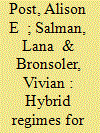|
|
|
Sort Order |
|
|
|
Items / Page
|
|
|
|
|
|
|
| Srl | Item |
| 1 |
ID:
156834


|
|
|
|
|
| Summary/Abstract |
There is a growing recognition that the state is not the sole provider of “local public goods” such as water and education in the developing world. Mainstream approaches to the study of local public goods provision, however, have yet to incorporate these insights. We offer a descriptive typology of hybrid local public goods regimes, or systems in which both state and non-state actors contribute to provision. It emphasizes two dimensions: the type of state involvement (direct versus indirect provision), and the degree of formal state penetration. The politics of producing local public goods, we argue, takes on distinct forms in each cell. The framework allows scholars to develop more accurate and precise explanations of variation in service quality and access, and to choose more appropriate outcome measures. We illustrate the utility of this framework by analyzing distinct hybrid regimes for water and sanitation, and mass transit in Africa, Asia, and Latin America.
|
|
|
|
|
|
|
|
|
|
|
|
|
|
|
|
| 2 |
ID:
150111


|
|
|
|
|
| Summary/Abstract |
The existing literature suggests different ways to explain the interconnection between technology, military, and society that creates changes in military affairs. It seems, however, that most of this literature concentrates on successful cases of military transformations and overlooks a significant number of failed transformations. The purpose of this article is to define the conceptual social-political-military environment that creates, or not, military transformations in general, and revolutions in military affairs (RMAs) in particular. Supporting its argument with two historical examples, this article suggests that an RMA is an outcome of traceable imbalance between political leadership, its military, and unmet political-military challenges. The conceptual framework proposed by the article significantly improves the ability of scholars and practitioners to explore, explain, and anticipate the possible directions of military transformations by a systematic examination of the political-military challenges that these transformations are intended to bridge and the socio-cultural environments that shape political-military decision-making processes.
|
|
|
|
|
|
|
|
|
|
|
|
|
|
|
|
|
|
|
|
|